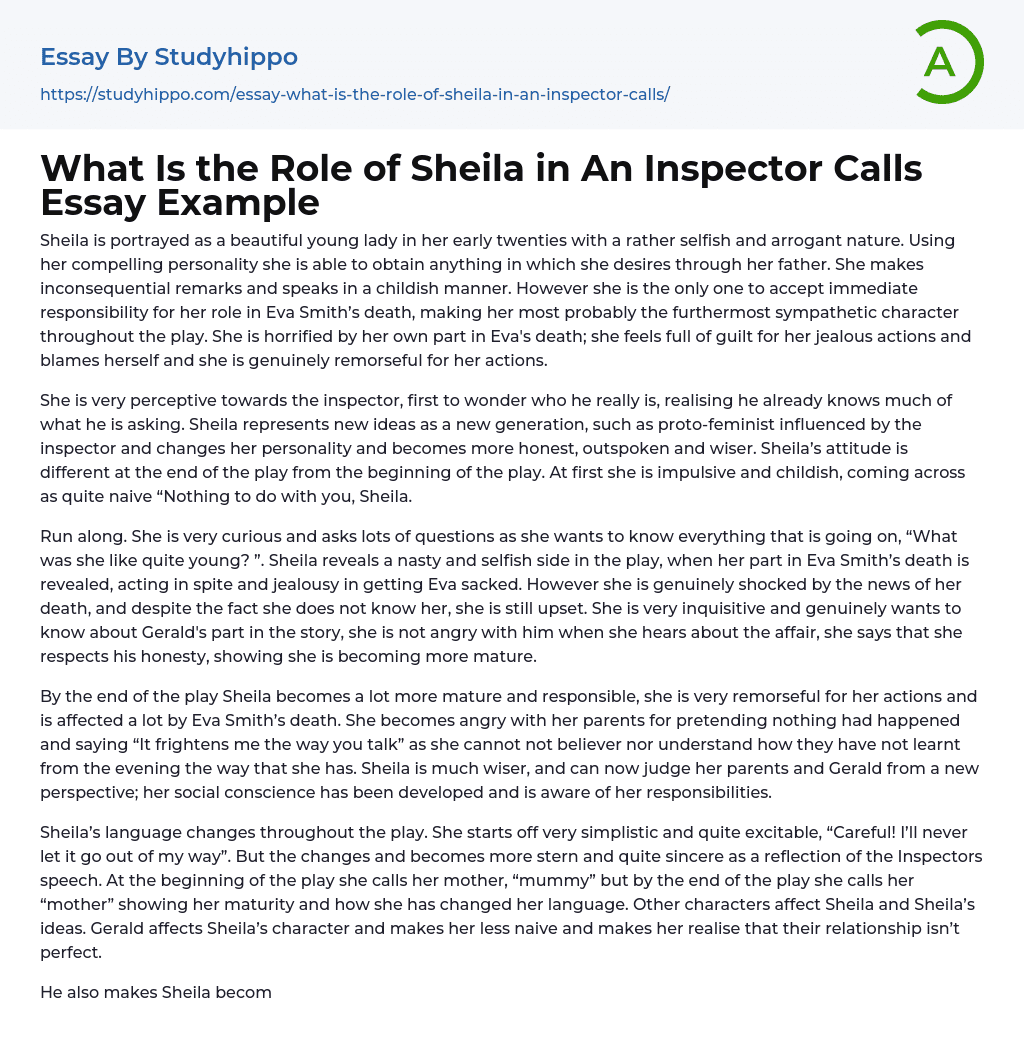

What Is the Role of Sheila in An Inspector Calls Essay Example
Sheila is portrayed as a beautiful young lady in her early twenties with a rather selfish and arrogant nature. Using her compelling personality she is able to obtain anything in which she desires through her father. She makes inconsequential remarks and speaks in a childish manner. However she is the only one to accept immediate responsibility for her role in Eva Smith’s death, making her most probably the furthermost sympathetic character throughout the play. She is horrified by her own part in Eva's death; she feels full of guilt for her jealous actions and blames herself and she is genuinely remorseful for her actions.
She is very perceptive towards the inspector, first to wonder who he really is, realising he already knows much of what he is asking. Sheila represents new ideas as a new
...generation, such as proto-feminist influenced by the inspector and changes her personality and becomes more honest, outspoken and wiser. Sheila’s attitude is different at the end of the play from the beginning of the play. At first she is impulsive and childish, coming across as quite naive “Nothing to do with you, Sheila.
Run along. She is very curious and asks lots of questions as she wants to know everything that is going on, “What was she like quite young? ”. Sheila reveals a nasty and selfish side in the play, when her part in Eva Smith’s death is revealed, acting in spite and jealousy in getting Eva sacked. However she is genuinely shocked by the news of her death, and despite the fact she does not know her, she is still upset. She is very inquisitive and genuinely wants to kno
about Gerald's part in the story, she is not angry with him when she hears about the affair, she says that she respects his honesty, showing she is becoming more mature.
By the end of the play Sheila becomes a lot more mature and responsible, she is very remorseful for her actions and is affected a lot by Eva Smith’s death. She becomes angry with her parents for pretending nothing had happened and saying “It frightens me the way you talk” as she cannot not believer nor understand how they have not learnt from the evening the way that she has. Sheila is much wiser, and can now judge her parents and Gerald from a new perspective; her social conscience has been developed and is aware of her responsibilities.
Sheila’s language changes throughout the play. She starts off very simplistic and quite excitable, “Careful! I’ll never let it go out of my way”. But the changes and becomes more stern and quite sincere as a reflection of the Inspectors speech. At the beginning of the play she calls her mother, “mummy” but by the end of the play she calls her “mother” showing her maturity and how she has changed her language. Other characters affect Sheila and Sheila’s ideas. Gerald affects Sheila’s character and makes her less naive and makes her realise that their relationship isn’t perfect.
He also makes Sheila become more serious. The break down in Sheila and Gerald’s relationship and when she finds out about Gerald’s affair, shows her maturity as she doesn’t get upset about it and respects Gerald more. The inspector influences Sheila and breaks down her traditional ideas and situates Eva in
relation to Sheila. The inspector influences Sheila and encourages her to change and think about other people rather than herself. The Inspector teaches Sheila about social morals and how discriminative the class system is.
Because of this, Sheila changes her morals and views on society. As a new generation, Sheila represents new ideas, such as proto-feminism, the inspector is a great influence from this. Proto-feministic ideas are clearly shown through many of Sheila’s responses to her father, and the other men in the play. It is clear Sheila reacts and responds in a way to suggest she wants equality, “I don’t believe I will” defying her mother and her generations idea on what marriage is, contrasting the views to what many women of her era would have been taught.
Other ways of Sheila acting in a contrasting way is her continuous cutting in to her father and Eric’s speech, the stage directions on many pages, “cutting in” “impatient, cutting in” showing she values her opinion over others. As a character, Sheila represents a new generation of ideas such as proto-feminist, she shows honesty and responsibility for her actions. By the end of the play Sheila starts to accept social criticisms which is what Priestley believed in.
- Values of Life essays
- Ethical dilemma essays
- Normative Ethics essays
- Virtue Ethics essays
- Belief essays
- Deontology essays
- Moral essays
- Virtue essays
- Work Ethic essays
- A Doll's House essays
- A Midsummer Night's Dream essays
- A raisin in the sun essays
- A Streetcar Named Desire essays
- An Inspector Calls essays
- Death of a salesman essays
- Everyman essays
- Fences essays
- Hamlet essays
- Hedda Gabler essays
- Iago essays
- King Lear essays
- Macbeth essays
- Much ado about nothing essays
- Oedipus Rex essays
- Oedipus The King essays
- Othello essays
- Pygmalion essays
- Romeo And Juliet essays
- Tartuffe essays
- The glass menagerie essays
- The Importance of Being Earnest essays
- The Merchant Of Venice essays
- The Taming of The Shrew essays
- Twelfth Night essays
- Waiting For Godot essays
- Acceptance essays
- Age Of Enlightenment essays
- Child Observation essays
- Confucianism essays
- Conscience essays
- Critical Reflection essays
- Destiny essays
- Determinism essays
- Empiricism essays
- Environmentalism essays
- Epistemology essays
- Ethics essays
- Ethos essays
- Existence essays
- Existentialism essays



